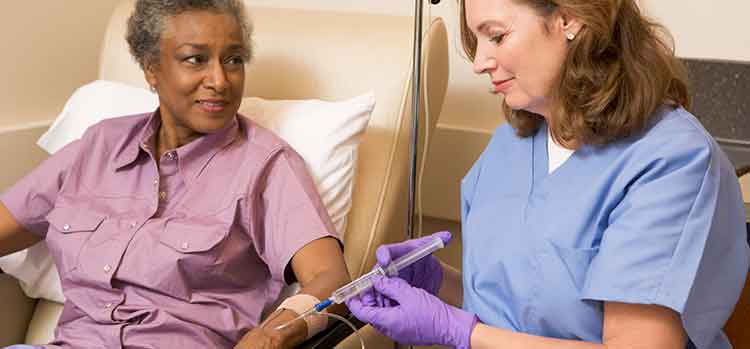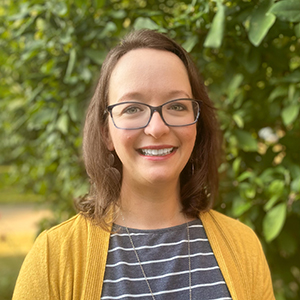Explore Related Nursing Specialties
A Guide to Becoming an Oncology Nurse Practitioner

Oncology Nurse Career Overview
Where you’ll work: Hospitals, cancer centers, palliative care centers, extended-care facilities, physician offices and clinics, home health and hospices.
What you’ll do: Provide care to cancer patients through chemotherapy, immunotherapy and other methods. Oncology nurses may act as a liaison between the patient and their care team.
Minimum degree required: ADN or BSN, but it’s common for employers to require that nurses have at least a BSN.
Who it’s a good fit for: The field of oncology is ever-changing as we continue to learn about how to treat cancer. An oncology nurse should want to keep learning as the field evolves. Since there is no cure for cancer, oncology nurses must be emotionally resilient as they encounter patients that may be fighting for their life.
Job perks: As an oncology nurse, you may get to be a part of cutting-edge cancer treatments.
Opportunities if you pursue a higher degree or certification: Getting certified as an Oncology Certified Nurse (OCN) is not required, but can demonstrate your expertise in the field and make you a more competitive job applicant. There are several other oncology nurse certifications as well, including Certified Pediatric Oncology Nurse (CPON), Certified Breast Care Nurse (CBCN) and more.
Median annual salary: $86,070
Oncology nurses care for cancer patients as they receive treatment. This specialty can be intense and demands a lot of compassion and resilience.
In this Article
How to Become an Oncology Nurse | Job Description | Where You’ll Work | Education | Online Programs | What to Look for in a School | Licensure | Gain Experience | Oncology Nurse Certification | Salary and Job Outlook | Professional Resources
How to Become an Oncology Nurse in 5 Steps
Use these steps as a guide to pursue a career in oncology nursing, a specialty that involves working with patients and their families and as a member of a healthcare team.
Decide if oncology nursing is right for you.

Working with patients with serious or life-threatening illnesses requires a high level of emotional intelligence and mental stamina.
Determine what education you’ll need.

You’ll need to earn either an Associate Degree in Nursing (ADN) or a Bachelor of Science in Nursing (BSN). Online programs are available.
Graduate from an accredited nursing program.

Earning a degree from an accredited program will qualify you to take the required licensing exam.
Get licensed as a registered nurse (RN).

With passing results from the licensing exam, you’ll be ready to apply for licensure with your state board of nursing.
Consider earning an oncology nurse certification.

Advanced certifications can help you move up in your career and make you a more competitive job applicant.
What Do Oncology Nurses Do?
Oncology nurses provide care to cancer patients through chemotherapy, immunotherapy, and other treatments. Their patients may be newly diagnosed, transitioning from cancer patient to cancer survivor, or have a terminal illness. Oncology nurses often serve as the point person and liaison between patients and other medical staff.
An oncology nurse’s patients may be newly diagnosed, transitioning from cancer patient to cancer survivor, or have a terminal illness.
Responsibilities of an Oncology Nurse
An oncology nurse has many roles. They are caregivers, educators, navigators, healthcare coordinators, and more. Their main responsibilities include:
Is Oncology Nursing a Good Fit for You?
Due to the sensitive nature of their work, oncology nurses should be natural caregivers, compassionate and able to adapt to challenging situations. Here are some skills and traits that can help an oncology nurse succeed.
Where You’ll Work
Oncology nurses work in a variety of settings. Your day-to-day tasks may vary based on both where you work and your specialty. Here are some common work settings and the role of oncology nurses who works there:
A Day in the Life of an Oncology Nurse
Since oncology nurses work across different settings, a typical day on the job can vary widely. Jaime Weimer, MSN, RN, AGCNS-BC, AOCNS, an oncology nursing specialist, describes a few day-in-the-life scenarios for oncology nurses:
“Typically, oncology nurses work collaboratively with other healthcare providers to ensure the patient’s plan of care is authorized, scheduled, and ordered correctly. They serve as clinical coordinators or nurse navigators to provide education to patients and families and ensure they have all the information and resources they need to attend their treatment appointments. A nurse in this setting might also take phone calls from patients who have received treatment and have questions or concerns about their symptoms or side effects.
Many oncology nurses work in an infusion department that is focused on administering chemotherapy or immunotherapy to patients. This includes starting IVs, accessing central lines like PICCs or implanted ports, providing injections or infusion therapy, and monitoring for acute side effects or infusion reactions. They also serve as a resource for education on what to expect at home following treatment and provide information and education for patients on how to take their medications at home to manage side effects and when to call if they aren’t feeling well.
Finally, some oncology nurses also work in research, so a day on the job might include helping to screen, enroll, and collect clinical information for patients who are taking part in clinical trials. This may include performing detailed assessments and screenings, ensuring specific tests and diagnostics are ordered and performed, and ensuring the patient receives their treatment as indicated by the research protocol. Research nurses in oncology play a vital role in ensuring the protocol is followed and the data collected is accurate and timely.”
Education to Become an Oncology Nurse
You’ll need to earn either an ADN or a BSN to become a registered nurse (RN) and pursue oncology as a specialty. Earning a BSN may lead to more leadership opportunities within a healthcare organization.
Associate Degree in Nursing
“An associate degree prepares nurses for entry-level positions following successful completion of the NCLEX examination and application approval for state nursing licensure,” says Weimer.
Bachelor of Science in Nursing
Weimer says a bachelor’s degree “provides a more robust curriculum that includes additional training in critical thinking, research appraisal, and professional practice leadership.”
“Many hospital systems encourage and prefer BSN-prepared nurses for specialty care units, such as oncology,” she says. “Roles that include additional responsibility and independence, such as nurse navigators, clinical coordinators, team leaders, and supervisory positions, will likely require a BSN as well as specialized clinical certification like the Oncology Certified Nurse (OCN) certification.”
Online Oncology Nursing Programs
There are many online nursing programs available for students who need a flexible schedule, like those with full-time jobs or family responsibilities. Students can do coursework online, but they’ll need to do all clinical and hands-on training in person.
There are also accelerated online programs in nursing for those who have already earned an ADN or a bachelor’s degree in another field. These programs can save you time and money because they let you apply some of your previous learning toward a BSN.
What to Look for in a School
Certain nursing programs may be a better fit than others. When you’re researching programs, look for the following:
Licensure
State nursing boards license nurses in their states. To be licensed as an RN, you’ll first need to pass the NCLEX-RN.
The test is pass/fail and contains a variety of question types, including multiple-choice and fill-in-the-blank.
After you receive official notice that you passed the exam, you can apply for licensure through your state’s nursing board. Most licensure applications require proof of graduation from an accredited nursing program, your NCLEX-RN test results and, in some cases, a background check.
Gain Experience
It’s common for recent nursing grads to gain work experience in general nursing before moving into a specialty like oncology.
“Jobs in inpatient units that care for general medical-surgical patients with cancer are a common place for new nursing graduates to get their start,” says Weimer. “Transitioning to units or departments that are dedicated to oncology care that treat critically ill patients or are providing intensive treatments may prefer nurses to have some experience before hiring them.”
It’s common for recent nursing grads to gain work experience in general nursing before moving into a specialty like oncology.
Weimer says that outpatient oncology areas “can be a challenging transition for new nurses, as the routine practice in these areas is not the focus of what is taught in nursing school. With the right preceptor and leader, new nurses can be successful in these areas but may need a longer orientation and training period to be fully independent in practice.”
Certification
Getting certified is optional, but it’s a great way to demonstrate your expertise. The professional recognition that comes with certification can also qualify you for more job opportunities and possibly lead to higher pay.
The basic certification for oncology nurses is the Oncology Certified Nurse (OCN) credential, but you’ll need to gain professional experience before you can earn it.
What It Is: A certification that demonstrates a high level of competency for caring for adults with cancer.
Who It’s For: Oncology nurses who want to distinguish themselves in the field and enhance their professional credentials.
Requirements: You must have:
Exam and Prep: The computer-based exam has 165 multiple choice questions and takes up to three hours to complete. It covers:
To pass, you’ll need to answer at least 97 questions correctly. The Oncology Nursing Certification Corporation offers a test outline to prepare for the exam, plus review and prep courses.
Specialty Certifications
If you want to focus on one aspect of oncology nursing, there are specialty certifications you can earn as well:
How Much Do Oncology Nurses Make?
According to the Bureau of Labor Statistics (BLS), RNs earn a median salary of $86,070. The BLS doesn’t differentiate between different types of nurses, but nurses who specialize tend to earn higher salaries.
Job Outlook
The BLS predicts that job openings for registered nurses will grow 5.6% through 2032, which is close to the average growth rate for all occupations.
Although the BLS notes that job prospects for all nurses are good, it also says RNs with a specialty and/or a BSN may have a competitive edge when applying for positions.
“All nursing roles are in demand right now, including those in oncology,” says Weimer. “Oncology is an exciting and rapidly changing field. It provides numerous opportunities for nurses to explore various practice settings while still using all their skills and knowledge to continue to practice at the top of their licensure.”
Although the BLS notes that job prospects for all nurses are good, it also says RNs with a specialty and/or a BSN may have a competitive edge when applying for positions.
Professional Resources
Tapping into professional associations and other resources can help you advance your career by expanding your network of colleagues, helping you stay on top of developments in your field, and advancing your skills and expertise. Resources like these may help you navigate your career as you move forward or alert you to new positions.
Here are a few professional resources to check out:
Oncology Nursing Society: A professional networking association that holds conferences and provides resources to develop your career.
Clinical Journal of Oncology Nursing: A bimonthly peer-reviewed journal that aims to improve cancer patient care by publishing timely articles.
International Society of Nurses in Cancer Care: An international networking and leadership development organization that holds conferences and offers education and training.
The Oncology Nursing Podcast: A biweekly podcast produced by the Oncology Nursing Society that interviews the nation’s top oncology nurses and experts on topics related to treating patients with cancer.


With professional insight from:
Jaime Weimer, MSN, RN, AGCNS-BC, AOCNS
Oncology Clinical Nurse Specialist, Oncology Nursing Society
